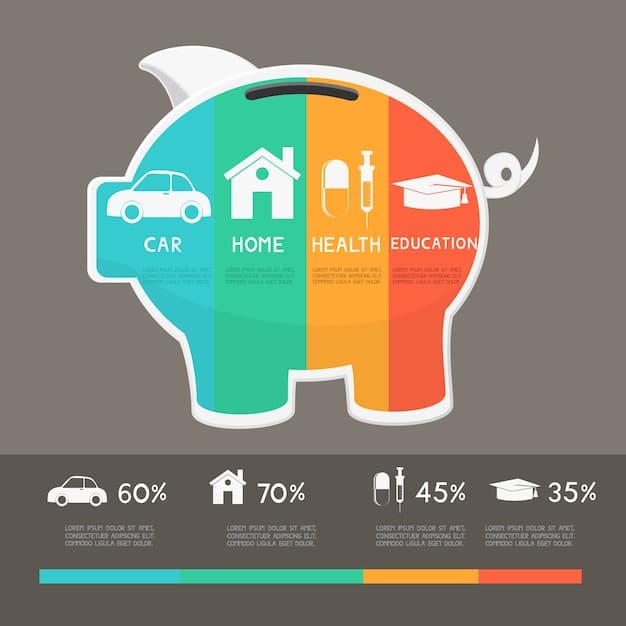5 Essential Questions to Ask Before Signing a Car Loan in 2025

Before signing a car loan in 2025, it’s crucial to investigate factors like interest rates, loan terms, the total cost, prepayment penalties, and available protection products to ensure financial stability and prevent future regrets.
Securing a car loan is a significant financial decision, especially as we look towards 2025. Before you sign on the dotted line, asking the right questions can save you from future financial headaches. This guide will cover 5 essential questions to ask before signing a car loan in 2025, ensuring you’re well-informed and prepared.
Understanding Interest Rates and APR
Interest rates are a critical component of any loan. Understanding how they work and what factors influence them is essential. The Annual Percentage Rate (APR) provides a more complete picture by including fees and other costs associated with the loan.
What is the difference between interest rate and APR?
The interest rate is the cost you pay to borrow money, expressed as a percentage. APR, on the other hand, includes the interest rate plus any additional fees, such as origination fees or administrative charges, making it a more comprehensive measure of the total cost of the loan.
How does my credit score affect the interest rate?
Your credit score is a major determinant of the interest rate you’ll receive. A higher credit score typically results in a lower interest rate, while a lower score may mean a higher rate, or even denial of the loan. Check your credit report and strive to improve your score before applying for a car loan.
- Check Your Credit Report: Obtain a free copy of your credit report from Experian, Equifax, and TransUnion.
- Improve Your Score: Pay down existing debt, avoid new credit applications, and correct any errors on your report.
- Shop Around: Get quotes from multiple lenders to compare interest rates and terms.
Understanding the nuances of interest rates and APR can save you a significant amount of money over the life of the loan. Be sure to factor these elements into your decision-making process to secure the best possible deal.
Evaluating Loan Terms: Short vs. Long
The loan term is the duration over which you’ll repay the loan. Choosing between a short and long loan term can have significant implications for your monthly payments and the total interest paid.
What are the advantages of a shorter loan term?
A shorter loan term means higher monthly payments, but you’ll pay off the loan faster and accrue less interest overall. This can save you money in the long run and help you build equity in your vehicle more quickly.
What are the advantages of a longer loan term?
A longer loan term results in lower monthly payments, making it more manageable for your budget. However, you’ll pay significantly more interest over the life of the loan. It’s important to consider whether the lower payments are worth the added cost.

- Assess Your Budget: Determine how much you can realistically afford each month.
- Calculate Total Interest: Use an online loan calculator to estimate the total interest paid for different loan terms.
- Consider Future Needs: Think about how your financial situation might change in the future.
Carefully evaluating loan terms is crucial for aligning your car loan with your financial goals and capabilities. Consider both the immediate impact on your monthly budget and the long-term cost of the loan.
Calculating the Total Cost of the Loan
Beyond the monthly payment, you need to understand the total cost of the loan, including interest, fees, and any additional charges. This provides a clear picture of what you’ll be paying over the entire loan term.
What fees are included in a car loan?
Car loans can include various fees, such as origination fees, documentation fees, and prepayment penalties. Make sure you understand what each fee covers and negotiate to minimize or eliminate them if possible.
How can I calculate the total cost of the loan?
Use an online loan calculator or consult with your lender to determine the total cost of the loan. Input the loan amount, interest rate, loan term, and any fees to get an accurate estimate. Compare this total cost across different loan options.
Understanding the total cost of the loan empowers you to make an informed decision that suits your financial situation. Paying attention to all associated fees ensures there are no surprises down the road.
Understanding Prepayment Penalties
Prepayment penalties are fees charged by lenders if you pay off your loan early. Knowing whether your loan includes these penalties is essential for maintaining flexibility in your financial planning.
What are prepayment penalties?
Prepayment penalties are designed to compensate lenders for the interest they would have earned if you’d continued making payments over the entire loan term. These penalties can reduce the benefits of paying off your loan early.
How can I avoid prepayment penalties?
When shopping for a car loan, ask lenders specifically about prepayment penalties. Opt for a loan without these penalties if possible. If you already have a loan with prepayment penalties, calculate whether the savings from early repayment outweigh the cost of the penalty.

- Read the Fine Print: Carefully review your loan agreement for any mention of prepayment penalties.
- Ask the Lender: Directly inquire about prepayment penalties and get the answer in writing.
- Consider Alternatives: If you anticipate paying off the loan early, choose a lender that doesn’t charge these fees.
Understanding prepayment penalties is a key part of responsible borrowing. By taking the time to investigate these fees, you can avoid unnecessary costs and maintain control over your finances.
Exploring Protection Products and GAP Insurance
Lenders often offer protection products like GAP insurance and extended warranties. While these can provide added security, it’s crucial to understand their value and whether they align with your needs.
What is GAP insurance and when is it necessary?
GAP (Guaranteed Auto Protection) insurance covers the difference between what you owe on your car loan and the car’s actual cash value if it’s stolen or totaled. It’s particularly useful if you’re financing a large percentage of the car’s value or if the car depreciates quickly.
What are extended warranties and are they worth it?
Extended warranties cover repairs beyond the manufacturer’s warranty period. They can provide peace of mind, but they also come at an extra cost. Evaluate whether the potential repair costs outweigh the expense of the warranty, and consider the reliability of your car model.
Exploring protection products requires careful consideration of your individual circumstances. Don’t feel pressured to purchase these products without thoroughly understanding their benefits and costs. Make an informed decision based on your needs and risk tolerance.
| Key Point | Brief Description |
|---|---|
| 💰 Interest Rates | Understand APR and how credit score affects it. |
| 📅 Loan Terms | Shorter term = higher payment, less interest. Longer term = lower payment, more interest. |
| 💸 Total Cost | Calculate fees to understand the loan’s total expense. |
| 🛡️ GAP Insurance | Consider if needed, especially if financing a large amount. |
Frequently Asked Questions
▼
A good interest rate depends on your credit score. Generally, a score above 700 can fetch rates between 4% and 6%. Scores below 600 might see rates exceeding 10%, so improving your credit is beneficial.
▼
Putting down at least 20% can help you get a lower interest rate and reduce your monthly payments. It also minimizes the risk of owing more than the car is worth, particularly in the early years.
▼
Yes, it’s possible to negotiate. Get quotes from multiple lenders, and use the best offer as leverage. Showing you’ve done your research and are willing to walk away can encourage lenders to offer better terms.
▼
The end of the month is often the best time, as dealerships are trying to meet their sales quotas. Weekdays, especially mid-week, can also offer better deals because dealerships tend to be less crowded.
▼
Absolutely. Getting pre-approved gives you a clear understanding of how much you can borrow and can strengthen your negotiating position at the dealership. It also allows you to shop around for the best interest rates.
Conclusion
By asking these 5 essential questions to ask before signing a car loan in 2025, you’ll be well-equipped to make a confident and informed decision. Understanding interest rates, loan terms, total costs, prepayment penalties, and protection products ensures your car loan aligns with your financial goals.





